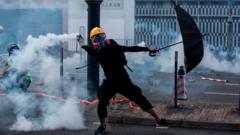In their hearts, memories of Hong Kong's vibrant rebellion fade like whispers in the wind. For Kenneth, walking through Victoria Park evokes a nostalgic yearning for a time when the streets brimmed with chants for democracy. He recalls childhood days where the park pulsed with gatherings for the Tiananmen Square massacre's annual vigils—an expression of freedom now crushed under the weight of Beijing's authority.
“People still carry on… but you can feel the change bit by bit,” he shares, a former activist who spoke under a pseudonym. Amidst Hong Kong’s seemingly unchanged exterior, he notes the subtle yet profound shifts, as the vibrant Cantonese culture yields to the encroachment of Mandarin and the pro-China narratives showcased in the illuminated skyscrapers.
The historical context runs deep; following the 1997 handover from British governance to Chinese rule, Hong Kong was promised autonomy—with sacred rights like freedom of speech—a promise that many believe has been betrayed. The protests, which surged in 2014, saw an outpouring of discontent as thousands took to the streets demanding democracy. Activists emerged, fueled by the desire for representation, culminating in the fiery demonstrations of 2019 against proposed extradition laws.
Now, as the decade of protests draws to a close, hopes for freedom have dimmed. In the aftermath of the sweeping National Security Law, many prominent activists, including Joshua Wong and Benny Tai, now find themselves behind bars. Yet, disillusioned yet defiant, Kenneth continues to cherish the memory of that vibrant, protest-filled experience that once defined his identity.
Simultaneously, the tale of Kasumi Law, who relocated to the UK, underscores the emotional conflict for many exiled Hongkongers. Despite the freedom she seeks for her daughter, she wrestles with a profound sense of loss, both for her homeland and its transformative spirit. The stark contrast in experiences illustrates the duality of Hong Kong identity under strain and the longing for a freer past.
Even in exile, Kasumi strives to nurture her roots, ensuring her child speaks Cantonese and understands the significance of their heritage. This struggle for identity persists amongst many, as they try to preserve a connection to a past marked by rebellion and hopes for democratization.
As Kenneth concludes his bittersweet reflection while revisiting sites of past protests, he quietly proclaims, “Forgetting the past is a form of betrayal.” Behind his thoughtful gaze lies the unwavering hope that indeed, such memories will endure, igniting the spirit of resistance in future generations despite Beijing’s relentless grip.
Both Kenneth and Kasumi’s stories encapsulate a transfer of memory, urging current and future generations to hold onto the spirit of Hong Kong’s once-vibrant fight for democracy—a spirit that remains alive in whispers, under the surface of a city that fights to remember its past amidst the pressures to forget.
“People still carry on… but you can feel the change bit by bit,” he shares, a former activist who spoke under a pseudonym. Amidst Hong Kong’s seemingly unchanged exterior, he notes the subtle yet profound shifts, as the vibrant Cantonese culture yields to the encroachment of Mandarin and the pro-China narratives showcased in the illuminated skyscrapers.
The historical context runs deep; following the 1997 handover from British governance to Chinese rule, Hong Kong was promised autonomy—with sacred rights like freedom of speech—a promise that many believe has been betrayed. The protests, which surged in 2014, saw an outpouring of discontent as thousands took to the streets demanding democracy. Activists emerged, fueled by the desire for representation, culminating in the fiery demonstrations of 2019 against proposed extradition laws.
Now, as the decade of protests draws to a close, hopes for freedom have dimmed. In the aftermath of the sweeping National Security Law, many prominent activists, including Joshua Wong and Benny Tai, now find themselves behind bars. Yet, disillusioned yet defiant, Kenneth continues to cherish the memory of that vibrant, protest-filled experience that once defined his identity.
Simultaneously, the tale of Kasumi Law, who relocated to the UK, underscores the emotional conflict for many exiled Hongkongers. Despite the freedom she seeks for her daughter, she wrestles with a profound sense of loss, both for her homeland and its transformative spirit. The stark contrast in experiences illustrates the duality of Hong Kong identity under strain and the longing for a freer past.
Even in exile, Kasumi strives to nurture her roots, ensuring her child speaks Cantonese and understands the significance of their heritage. This struggle for identity persists amongst many, as they try to preserve a connection to a past marked by rebellion and hopes for democratization.
As Kenneth concludes his bittersweet reflection while revisiting sites of past protests, he quietly proclaims, “Forgetting the past is a form of betrayal.” Behind his thoughtful gaze lies the unwavering hope that indeed, such memories will endure, igniting the spirit of resistance in future generations despite Beijing’s relentless grip.
Both Kenneth and Kasumi’s stories encapsulate a transfer of memory, urging current and future generations to hold onto the spirit of Hong Kong’s once-vibrant fight for democracy—a spirit that remains alive in whispers, under the surface of a city that fights to remember its past amidst the pressures to forget.




















